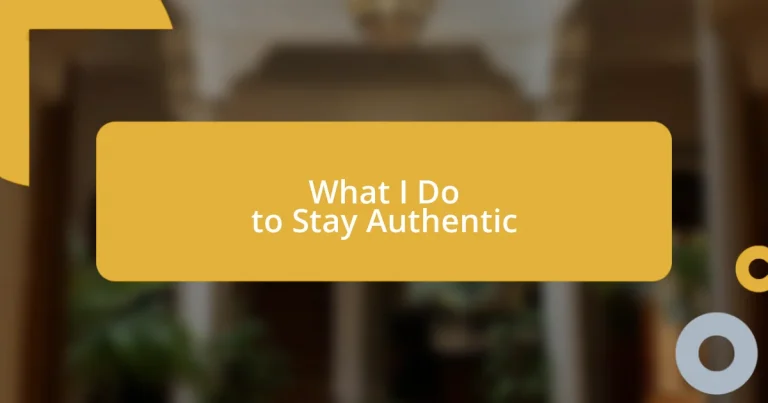Key takeaways:
- Personal authenticity involves introspection, embracing both strengths and vulnerabilities, and aligning choices with core values.
- Practicing self-awareness through mindfulness, journaling, and open communication enhances personal growth and fosters authentic connections.
- Setting healthy boundaries and reflecting on personal growth are crucial steps for nurturing authenticity and overall well-being.
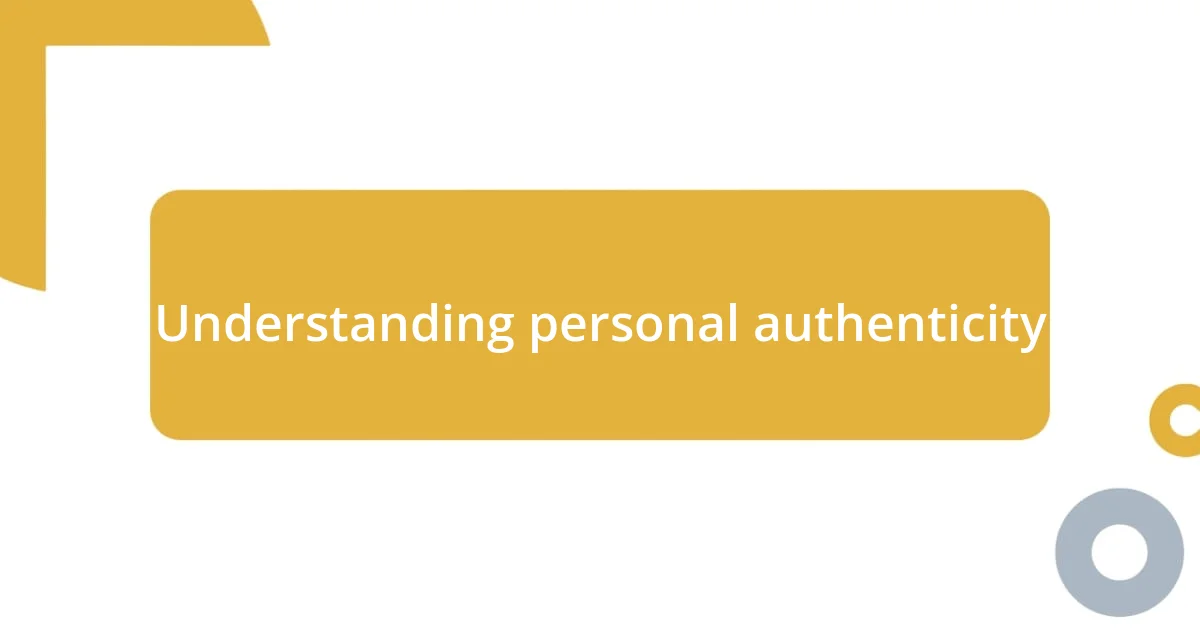
Understanding personal authenticity
Personal authenticity is about being true to oneself, which often means embracing both strengths and vulnerabilities. I remember a time when I felt pressured to conform to a certain image at work; it was exhausting and unfulfilling. Have you ever felt the strain of not being your true self in a professional or social setting? It’s a heavy burden to carry, and it robs us of genuine connection.
At its core, understanding personal authenticity requires introspection and courage. I often reflect on my values and how they align with my actions. When I faced a difficult decision recently, I asked myself, “Does this choice honor who I am?” That question led me to the right path. It’s a powerful practice everyone should consider; what do your choices say about you?
Finding your authentic self can be a journey filled with challenges and revelations. There have been moments when I had to shed expectations from family and friends to pursue my passions. It felt liberating but also daunting to step away from their visions of success. Isn’t it fascinating how our true selves can sometimes emerge only after overcoming the fear of disapproval?
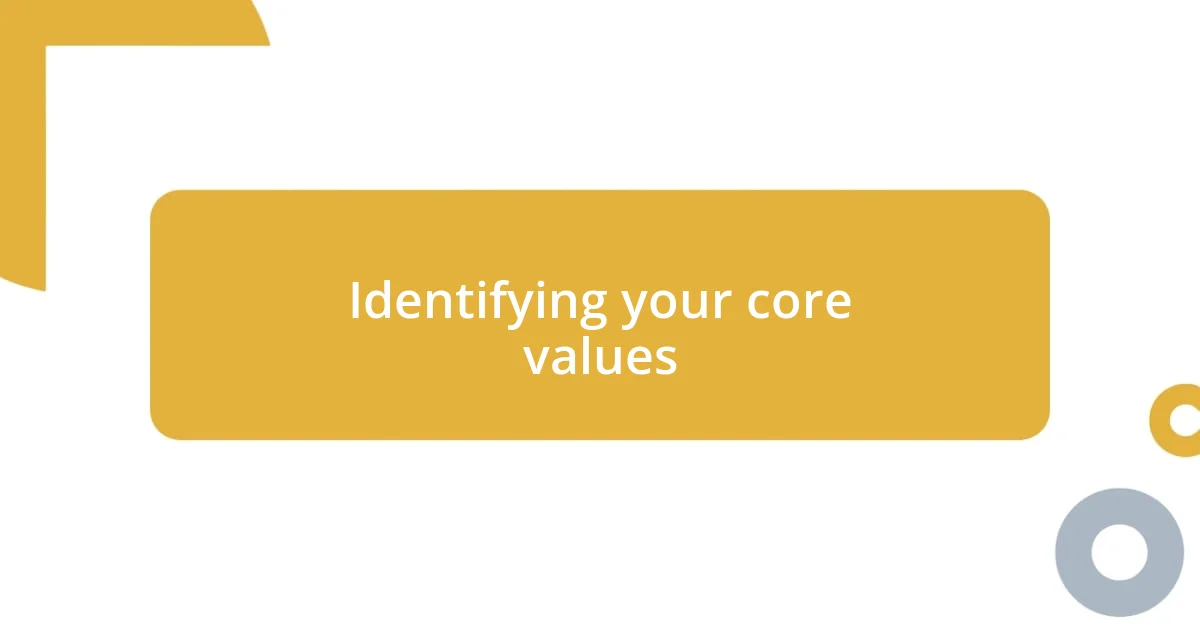
Identifying your core values
Identifying your core values requires honest self-reflection. I recall sitting quietly one afternoon, trying to distill what truly matters to me. It was like peeling an onion; each layer revealed something deeper about my beliefs and priorities. When I finally wrote down my top three values—integrity, compassion, and growth—I felt a sense of clarity. It became easier to navigate decisions, both small and significant.
I often encourage friends to try listing their core values, too. It opens up pathways to understanding how our choices align with what we stand for. For instance, when I prioritized growth, I began to seek out learning experiences that challenged me, rather than those that just felt comfortable. Has taking such risks ever shaped your journey? For me, it was a thrilling leap toward authenticity.
As we ponder our core values, our emotions can guide us. I remember feeling an overwhelming sense of joy when I volunteered at a local shelter. In that moment, it was clear that compassion wasn’t just a value; it was a vital part of my identity. Understanding this has made me more attuned to seek opportunities that resonate with my heart, reinforcing the authenticity I strive for.
| Core Values | Importance |
|---|---|
| Integrity | Guides ethical decisions |
| Compassion | Fosters connection with others |
| Growth | Encourages continuous learning |
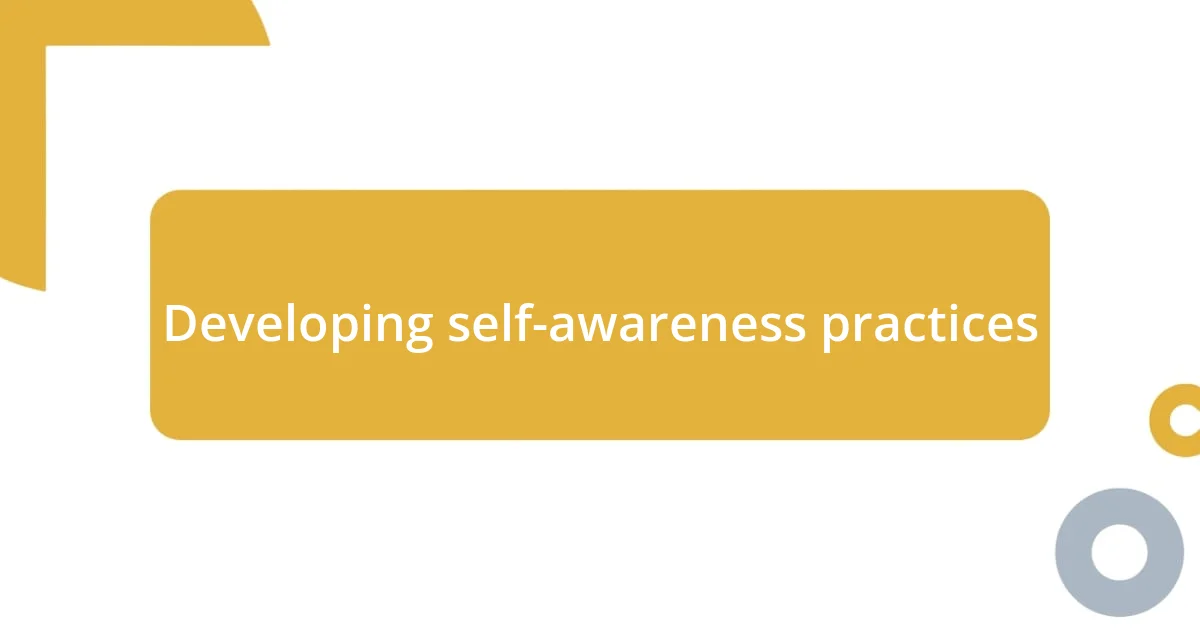
Developing self-awareness practices

Developing self-awareness practices
One of the most transformative self-awareness practices I’ve adopted is mindfulness. I remember the first time I tried a guided meditation; I felt a mix of skepticism and hope. Surprisingly, as I focused on my breath and observed my thoughts, I discovered emotions I had been ignoring, like anxiety and restlessness. This practice has since become a safe space where I can really tune into my inner self, reflecting on my feelings without judgment.
To continue cultivating self-awareness, I’ve found the following practices helpful:
- Journaling: I set aside time each week to write about my thoughts and feelings, which helps me clarify my emotions and patterns.
- Body Scan: I dedicate a few minutes each evening to check in with my body, noticing areas of tension or discomfort.
- Feedback from Others: I reach out to friends for honest feedback about my behavior, as it provides valuable insights into how I come across to others.
- Solo Walks: When I take long walks without music or distractions, I allow my thoughts to flow freely; sometimes, I stumble upon profound realizations about myself.
The beauty of these practices is they not only deepen my self-awareness but also lead to personal growth. Isn’t it interesting how the simplest actions, like taking a walk or putting pen to paper, can unlock such profound insights?
Integrating these practices into my daily routine has been enlightening. For instance, I once had a tough conversation with a colleague where I misjudged my tone and came across as dismissive. Upon reflecting during a mindfulness session later, I realized how my stress influenced my interactions. It was a wake-up call—one that pushed me to approach future discussions with more empathy and awareness. Isn’t it empowering to know that with a little effort, we can continuously refine our understanding of ourselves?
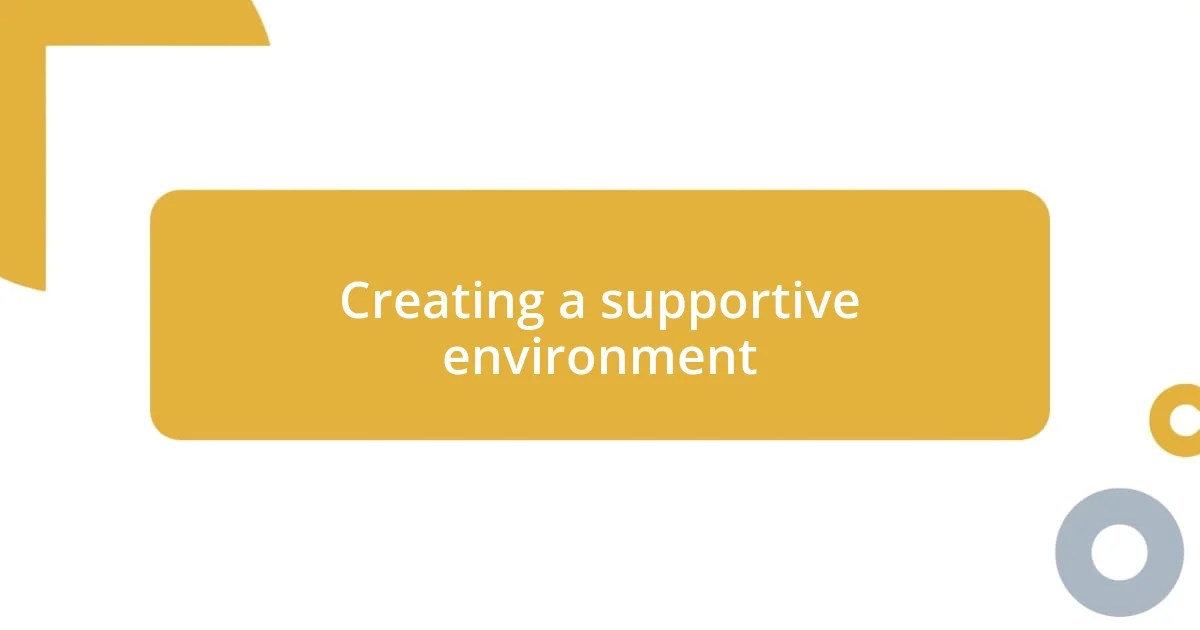
Creating a supportive environment
Creating a supportive environment is crucial for staying authentic, and I’ve realized that surrounding myself with the right people makes all the difference. I remember when I made a conscious effort to connect with friends who share my values. It quickly became a space where vulnerability was welcomed, and I felt empowered to express my true self without fear of judgment. Have you noticed how an encouraging word or a listening ear can uplift your spirit? It’s amazing how support can create a safety net that allows authenticity to flourish.
Another key aspect of nurturing a supportive environment is fostering open communication. I once participated in a group where we made it a point to practice honesty in discussions. At first, it felt a little uncomfortable sharing my thoughts, but gradually, it became liberating. Each time someone spoke their mind, it inspired me to do the same. Why is it that truth can be both daunting and freeing at the same time? When everyone contributes openly, it paves the way for deeper connections and a richer understanding of one another.
Finally, I’ve learned that celebrating each other’s successes reinforces a positive atmosphere. It’s not just about supporting each other during tough times; it’s also about cheering for achievements, big or small. I remember jumping with joy for a friend who got promoted, and in that moment, I felt our bond strengthen. How often do we take time to acknowledge the wins in our lives? These moments of recognition create a ripple effect, encouraging everyone in the group to pursue their passions and remain true to themselves.
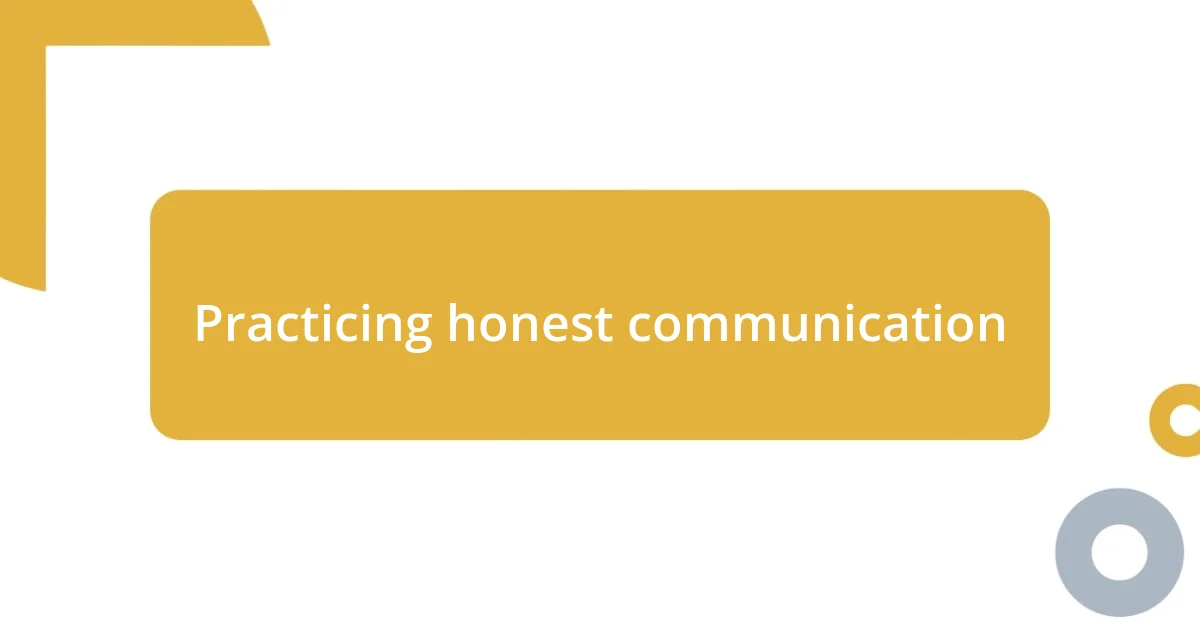
Practicing honest communication
Practicing honest communication has been a game changer for me. I remember a conversation I had with my best friend where I had to express some feelings that had been sitting uncomfortably with me. It felt risky, opening up about my fears of not being understood. But the moment I decided to share from the heart, I felt an immense weight lift off my shoulders. Have you ever experienced that sense of relief after speaking your truth? It’s like a fresh breeze after being in a stuffy room.
I’ve also learned that it’s crucial to be mindful of my tone and body language. There was an instance when I unintentionally dismissed a colleague’s idea during a brainstorming session. My words were fine, but my expression said otherwise. I realized that even the slightest miscommunication could cloud intentions. It taught me to convey my thoughts thoughtfully—after all, communication isn’t just about what we say; it’s about how we say it. How often do we forget that our nonverbal cues can overshadow our intentions?
Another aspect I embrace is vulnerability in communication. Sharing my struggles and doubts has introduced a deeper connection in my relationships. Just recently, I opened up about my imposter syndrome during a team meeting. To my surprise, several colleagues echoed my feelings, turning a moment of apprehension into a powerful discussion. That shared experience sparked a sense of camaraderie that I hadn’t anticipated. Isn’t it incredible how being authentic can create a space where others feel safe to do the same? It’s a beautiful reminder that honesty can weave us closer together, forging bonds that thrive on trust and understanding.
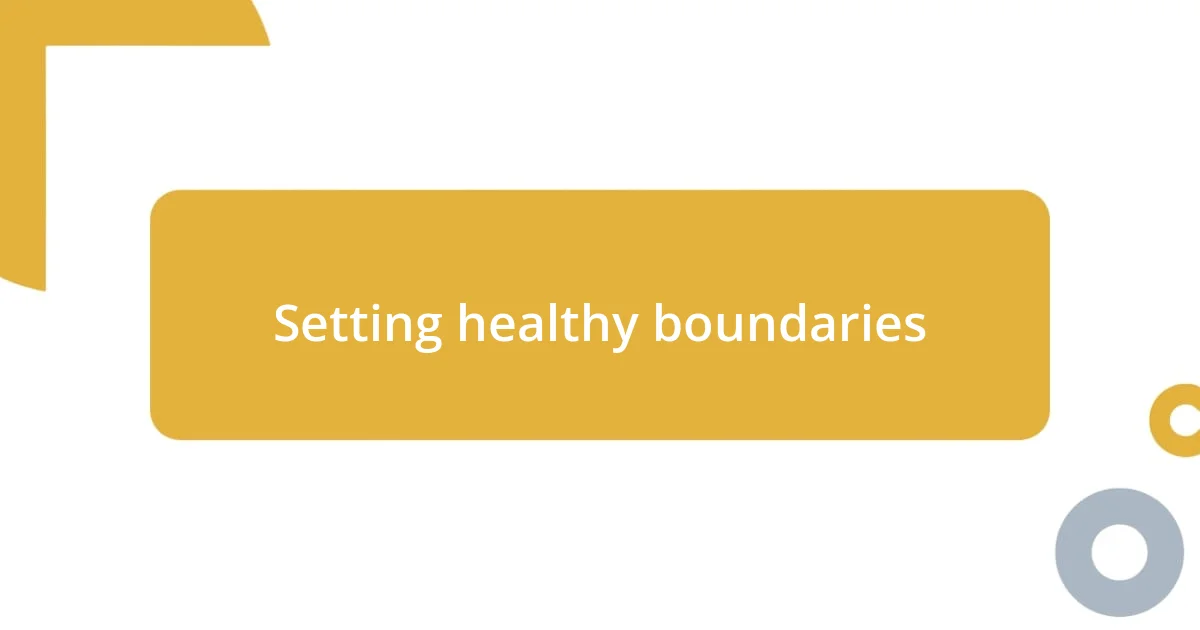
Setting healthy boundaries
Setting healthy boundaries has profoundly influenced my journey toward authenticity. For example, I once committed to a project that left me overwhelmed, stretching my time and energy too thin. Realizing this, I decided to communicate my limits to my team. What a relief it was to say, “I can’t take on more right now,” and watch as they respected my honesty. Doesn’t it feel empowering when you acknowledge your own limits, instead of pushing yourself to the brink?
I’ve also found that establishing boundaries doesn’t have to be rigid. Sometimes, it’s about the little, everyday choices. One day, I opted to turn off my work notifications after a certain hour. Initially, I felt guilty about stepping away, but then I recognized how crucial that time was for my mental health. Have you ever paused to consider how uninterrupted time can recharge your spirit? It allowed me to reconnect with my passions outside of work, reaffirming that my identity isn’t solely tied to my professional obligations.
Additionally, I try to assess my relationships regularly. I remember a friendship that drained me more than it nourished me. One day, I decided to have an open conversation about how I felt—and to my surprise, they were receptive. Even situations that feel daunting can lead to growth when approached with honesty. Isn’t it interesting how setting boundaries can redefine a relationship, creating a healthier dynamic? By prioritizing my well-being, I found that both my sense of self and my connections became richer and more fulfilling.
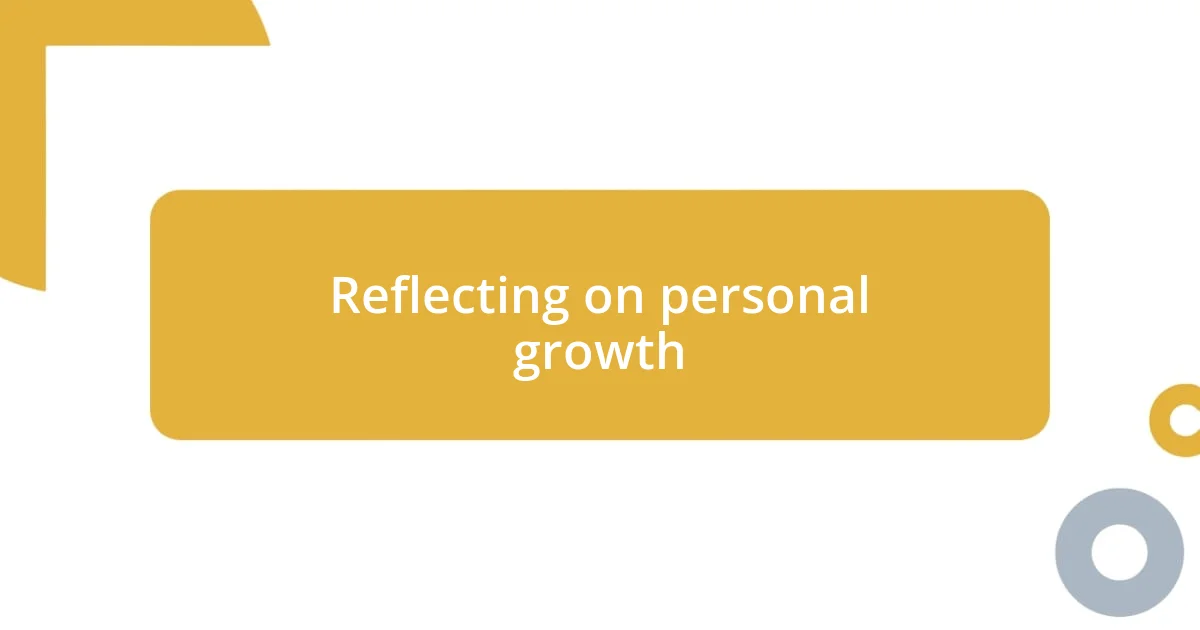
Reflecting on personal growth
Reflecting on personal growth is an ongoing journey, and I often find myself revisiting pivotal moments that shaped who I am today. A few years back, I faced a challenging decision regarding a career path that didn’t align with my values. That experience forced me to dive deep into self-examination, questioning what truly mattered to me. Have you ever had to choose between convenience and authenticity? It’s those moments of uncertainty that can lead to profound clarity.
There are times when I’ve encountered setbacks that initially felt like failures but turned out to be my greatest teachers. I remember a job opportunity I missed because I hesitated to showcase my true self during the interview. The disappointment stung, but it also ignited a desire within me to understand what went wrong. I learned that aligning my actions with my core beliefs is not only crucial for personal authenticity but is also a pathway to growth. Isn’t it fascinating how our missteps often lead to the most valuable lessons?
I also try to celebrate small victories along this journey. Recently, I took a moment to appreciate how far I’ve come in trusting my instincts. I used to second-guess myself constantly, but now, I relish the times I speak up, whether in meetings or casual conversations. Recognizing these changes in myself—isn’t it empowering? It reminds me that growth isn’t just about monumental shifts; often, it’s found in daily choices that reaffirm who we are. Each reflection brings me one step closer to becoming the authentic version of myself I strive to be.












